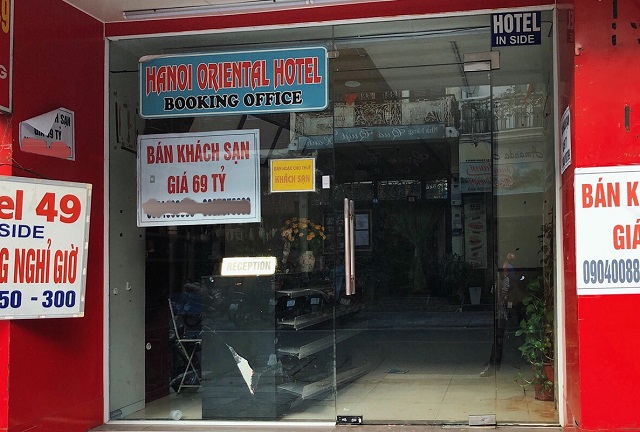The decline in the number of visitors and revenue due to the COVID-19 pandemic has led many investors to sell their hotels.

The decline in the number of visitors and revenue due to the COVID-19 pandemic has led many investors selling their hotels.
The pandemic has left efforts to stimulate domestic tourism in tatters, as many tourists cancelled tours and some popular destinations have had to be closed.
Figures from the General Statistics Office showed that in the first eight months of the year, the number of international visitors to Viet Nam only reached nearly 3.8 million, down 66.6 per cent over the same period last year. Travel tourism revenue in the period was estimated at VND13.1 trillion, a 54.4 per cent year-on-year decrease.
Hotels with “for sale” signs have been seen in many places, such as five-star Grand Vista Ha Noi (Ha Noi) for VND950 billion (US$40.9 million) and Pullman Saigon Centre in HCM City. Many two to four-star hotels have been also offered for sale as investors are unable to cover operation costs without guests.
Le Xuan Vinh, director of Nam Dang Tourism and Trade Company Ltd, said the firm has suffered severe difficulties due to COVID-19. From the beginning of the third quarter this year, the company stopped operation of some accommodation business premises due to no revenue.
He said the firm was looking for partners to sell shares of some operating hotels due to insufficient capital and if landlords don't lower rent on the hotels, it could go bankrupt.
Selling hotels is considered the last solution to recover capital, but investors have also admitted it is very difficult to sell their hotels now as few investors can take risks with debt in a pandemic-battered tourism market.
Nguyen Van Dinh, Vice Chairman of the Viet Nam Association of Real Estate Brokers (VARS), said tourism real estate and accommodation is the segment most heavily affected by COVID-19 and these difficulties are expected to continue.
If the pandemic ends in the third quarter, the market is forecast to begin recovering by the end of this year. If the pandemic lasts until the end of the year, the tourism property segment would still be “hibernating” until the end of 2021, Dinh said.
According to Tran Trong Kien, Chairman of the Viet Nam Tourism Advisory Board, it is necessary to improve service quality and cut costs to cope with difficulties caused by the pandemic and recover the tourism market.
Big tourism businesses need to commit not to sell unsafe and low-quality products. In addition, it is necessary to strengthen links between businesses and localities to diversify products and service supply chains.
Office buildings in the same situation
As well as hotel owners, the owners of office buildings are also looking to offload their property, with buildings in the centre of HCM City selling for hundreds of billions of dong.
Recently, a 10-storey building with an area of nearly 350sq.m in front of Nguyen Binh Khiem Street, District 1, sold for more than VND180 billion. A housing broker told online newspaper plo.vn that previously, the building owner earned about VND500 million a month.
The owner reportedly sold the office building because customers returned their rentals. In recent months, the number of tenants was only about 30 per cent and the building owner had to pay bank debts.
According to a survey by CBRE Vietnam, the majority of requests in the second quarter were office relocation, accounting for 72 per cent of total inquiries from their customers. There were a number of large tenants relocating from Grade A (high-end) buildings to Grade B (mid-end) or even lower. This movement was far different from 7-8 months ago before COVID-19, then office rents in big cities were still high and the vacancy rate did not exceed 7 per cent.
Nguyen Duc Lam, the owner of a Grade A office building in HCM City, said the number of new tenants had decreased by 50 per cent although they have slashed prices.
Lam said the tenants of the building are mainly foreign enterprises and COVID-19 has caused some businesses to switch to working online, while others stopped working.
Companies that rent space have switched to renting places at lower costs, even moving to remote districts or renting apartments.
Su Ngoc Khuong, senior director of investment at Savills Vietnam, said the retail, hotel and office rental industries are being heavily affected by economic difficulties. Viet Nam has witnessed a significant decrease in the number of international visitors, especially Chinese and South Korean visitors.
Khuong said the buildings have to be sold mainly because owners have limited financial capacity. In addition, they use high financial leverage, meaning they can't bear a debt burden.
However, there are still many investors with good financial capacity and market experience. They are, together with foreign investors, searching for projects in the market.
Foreign investors are very interested in Vietnamese real estate and have targeted office buildings, hotels and residential areas, spread over all three regions, with the greatest concentration on Ha Noi and HCM City. It is expected that in the third or fourth quarter of the year, there will be the first successful co-operation deals with foreign investors, he added.
Real estate expert Le Ba Chi Nhan said office building owners were forced to sell their assets because of bank loans and investment losses in other areas. Unlike hotels, office buildings can sell for more than VND100 billion or several hundred billion dong and chances of having customers buyback are still higher because of less risk. — VNS





